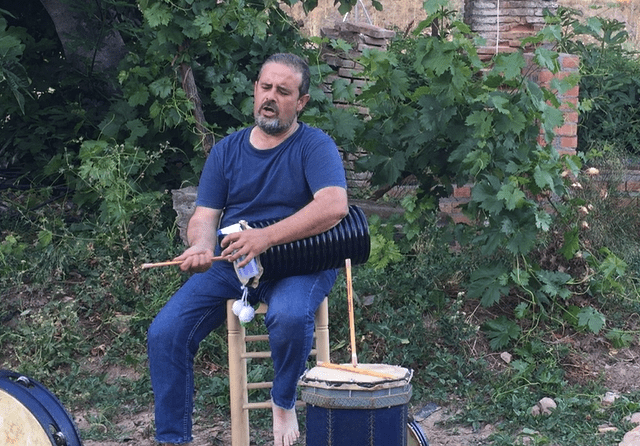Christmas time is coming! Many countries in Europe have already set the Christmas markets and Christmas lights have been turned on in many cities and towns. Such a relevant time of the year, full of celebrations and rituals, is reflected on the music. Let’s talk with Juan Antonio Torres, leader of the band from Toledo Vigüela, to find out how is the music they play in the center of Spain for Christmas time. Specifically, Araceli Tzigane from Mapamundi Música, asked him about the genre of the “son” and the “zambomba”.
Juan Antonio Torres performs a son for Christmas Eve alone with the zambomba:
Araceli Tzigane:
In your area and generally in the central region of Spain, around Christmas Eve, the zambomba is played, is that correct?
Juan Antonio Torres:
Yes, by the end of November, the desire to make the zambombas sound begins, and the traditional zambomba repertoire is sung, lasting until mid-January.
Araceli Tzigane:
What kind of music is it? I mean, the zambomba is played, but what else? Are there other instruments, or voices, or guitars…?
Juan Antonio Torres:
The zambomba plays the ‘sones de zambomba’ (zambomba sounds). It generates a monotonous rhythmic cadence produced by the zambomba and other accompanying instruments, such as ‘almireces’ (cylindrical wooden percussion instruments), bottles beaten with a fork or spoon, pot lids, tambourines, ‘cañas’ (substitute for castanets)… Any utensil that helps create the sound is welcome to accompany the traditional zambomba song. Guitars are not involved in this genre; they are used in others like ‘jota,’ ‘fandango,’ and ‘seguidilla.’
Araceli Tzigane:
What was the context in which this music was performed, say, 50 years ago? And now, does that context of use still exist, or are there new contexts, or has it stopped being performed?
Juan Antonio Torres:
The end of autumn and the onset of winter were periods when agricultural work was scarce. Therefore, men would gather in taverns, having more leisure time. That’s where the context for using these songs and zambomba music arose. Currently, everything adapts to new ways, both in leisure activities and in the use of repertoires and forms of interpreting the ‘sones de zambomba.’ The contexts are different now; nowadays, the use of the repertoire is centered around the Christmas period, and the music’s usage and repertoire have undergone significant transformations, being influenced by contemporary languages far from traditional codes.
Araceli Tzigane:
What themes are addressed in this music, are they solely religious?
Juan Antonio Torres:
The songs cover various themes, often narrating everyday life events of people. When songs talk about feelings, the lyrics are timeless and valid for any ancient or modern era. The same happens when they mock socially esteemed figures (priests, friars, mayors, etc.). The songs discuss work, ways of life, women, men, their relationships, their feelings… This music, like others, is used to express ideas and sentiments.
Religious themes in this music talk about the Birth of God, the Gospels, and God’s life but specifically relate to Christmas. This genre (zambomba music) encompasses other concerns and interests of the people; that’s why it covers much more than just religious aspects.
Araceli Tzigane:
Is it possible to experience this music in its context of popular use somewhere?
Juan Antonio Torres:
As it is conceived and performed now, we find this music all over Spain when Christmas arrives. In some places, it continues during any winter time (winter chants). However, it’s still used, although it’s important to clarify that from an anthropological standpoint, it may be active, but musically, this music is no longer interpreted with the traditional codes that have been inherited. Instead, it’s performed with substitutes that the musicians have incorporated, believing them to be traditional. That’s why when the elders are asked why things don’t sound the same as before, they say the following phrase: “Because the current ones don’t know that they don’t know.”
Los Pastores de Casavieja (the shepherds from Casavieja) are one of the main representatives interpreting the zambomba sound in its traditional way :


